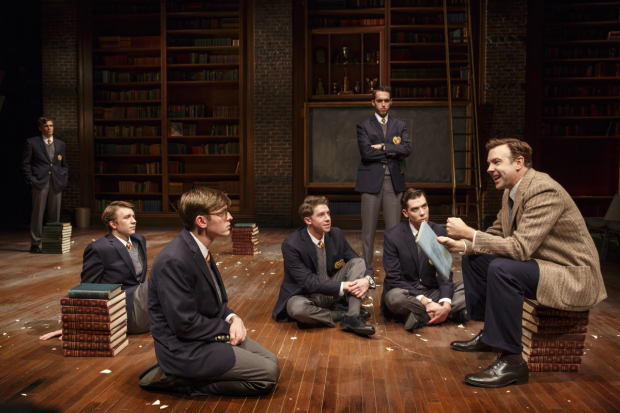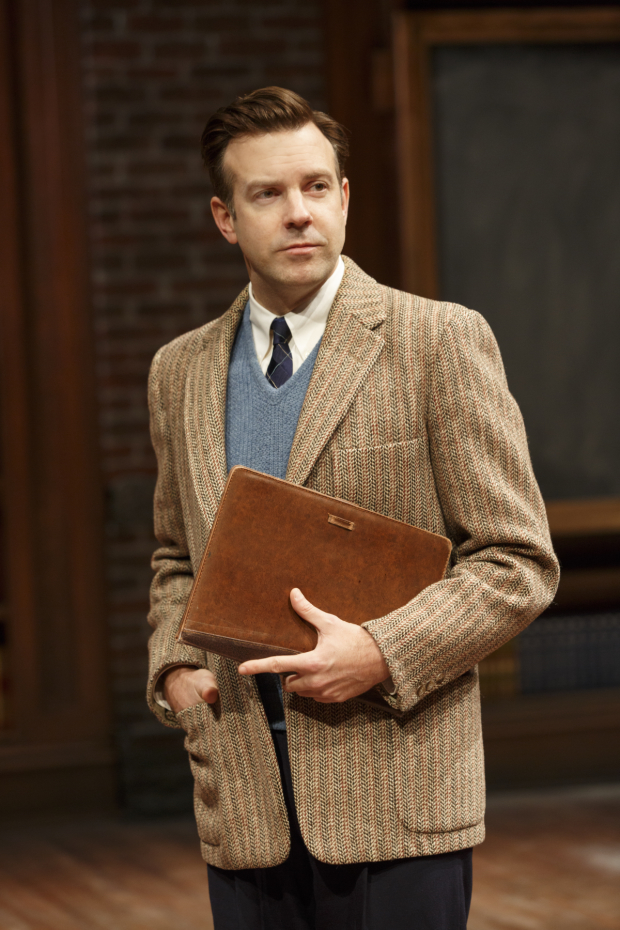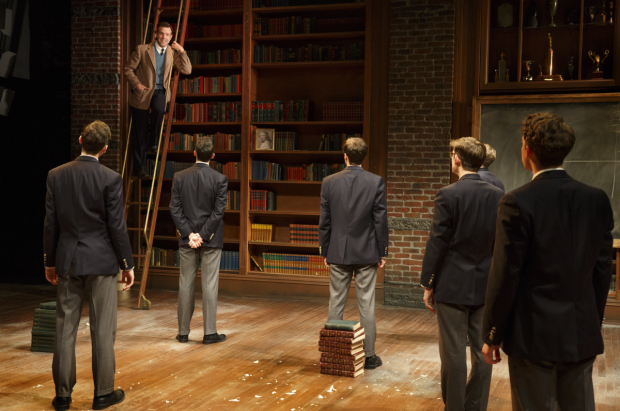
(© Joan Marcus)
In an age when misinformation is everywhere and critical thinking seems to be at low tide, perhaps it is time to reevaluate our national fetishization of STEM (Science, Technology, Engineering, and Mathematics) education. While it is fashionable to look covetously on China and Japan for their students' mastery of these fields, memorization and test prep are not enough: A strong liberal education is essential for the maintenance of a free and innovative society.
Tom Schulman makes just that argument in his 1989 Academy Award-winning screenplay for Dead Poets Society, about a free-spirited English teacher (it's always an English teacher) who encourages his overprepared prep students to think outside the box. Schulman has now adapted his screenplay for live performance at Classic Stage Company. It's a faithful yet economical presentation of the story, but it is hard to see what the stage adds to the original property.
Taking place in New England circa 1959, the story follows John Keating (Jason Sudeikis, boldly reinventing a role originated by Robin Williams), a new English teacher at the elite Welton Academy. His students include conformist overachiever Richard Cameron (Yaron Lotan), the lovesick Knox Overstreet (William Hochman), and Steven Meeks (an appropriately meek Bubba Weiler). On the first day, Mr. Keating has his students turn to an introductory essay in their textbooks that prescribes a mathematical formula for evaluating poetry. He tells them to rip it out. Scraps of the essay litter the floor, allowing the rest of the play to be staged on top of this heavy-handed visual metaphor. What follows is an affirming tale of youthful rebellion, with the students following their individual dreams and sneaking away to a nearby cave to read verse as part of the hitherto disbanded Dead Poets Society.

(© Joan Marcus)
Sudeikis impressively steps out of the long shadow of Robin Williams in his gutsy portrayal of Mr. Keating. Rather than a gushing romantic, he's the General Patton of poetry, not afraid to crack a few heads if it will let the sun shine into his students' impressionable minds. It makes his character feel more like a real teacher and less like a male Mary Poppins. With his earthy presence, Sudeikis almost overcomes the fact (inherent in the script and screenplay) that Keating's methods don't really amount to much more than the tricks of a second-rate motivational speaker. We know he's a great teacher from the effect he has on his students, but we don't really see what he did to get them there.
Perhaps some students only need the tiniest bit of encouragement: Kostro seems to be channeling David Bowie in his portrayal of Charlie Dalton, the most eager revolutionary of the bunch (he changes his name to "Nuwanda" before the end of the play). Thomas Mann takes a softer approach to the rebellion of Neil Perry, the boy who wants to be an actor despite the strong objections of his father (an intimidating Stephen Barker Turner). Zane Pais adds shades of subtlety and nuance to the role of Todd Anderson, which is remarkable considering how rigidly his character arc is defined by the script (he goes from stuttering to being the bravest in the class).
Schulman has smartly condensed his original screenplay, reassigning scenes to a smaller cast of characters and eliminating others altogether. The run time has been shaved down by 30 minutes without losing anything from the story, though an opening moment in which the students sheepishly hand out show programs feels more like a desperate afterthought than a boldly immersive staging concept.
Strange feints at audience interaction aside, John Doyle's staging is typically efficient, with one scene bleeding into the next. The actors rearrange stacks of books to create all the scenery (evocative yet minimal set by Scott Pask). Costume designer Ann Hould-Ward wisely opts for the iconic: The boys don conservative school uniforms (Welton Academy has the same colors as Gryffindor) and Keating wears tweed. Lighting designer Japhy Weideman gorgeously re-creates moonlight for the poetry reading scenes, during which sound designer Matt Stine adds a mechanical echo to the actors' voices that makes them sound like robots in a cave.

(© Joan Marcus)
Despite Doyle's breezy production and solid performances from the cast, the show doesn't make a very good argument for its necessity onstage. You can get the exact same story on-screen, much of the dialogue word for word.
None of this diminishes the themes of the film, which are more relevant than ever: When we are in our most vulnerable and formative years, a good teacher who encourages free thought can make all the difference. Let's make sure we have more of those in 2017.









